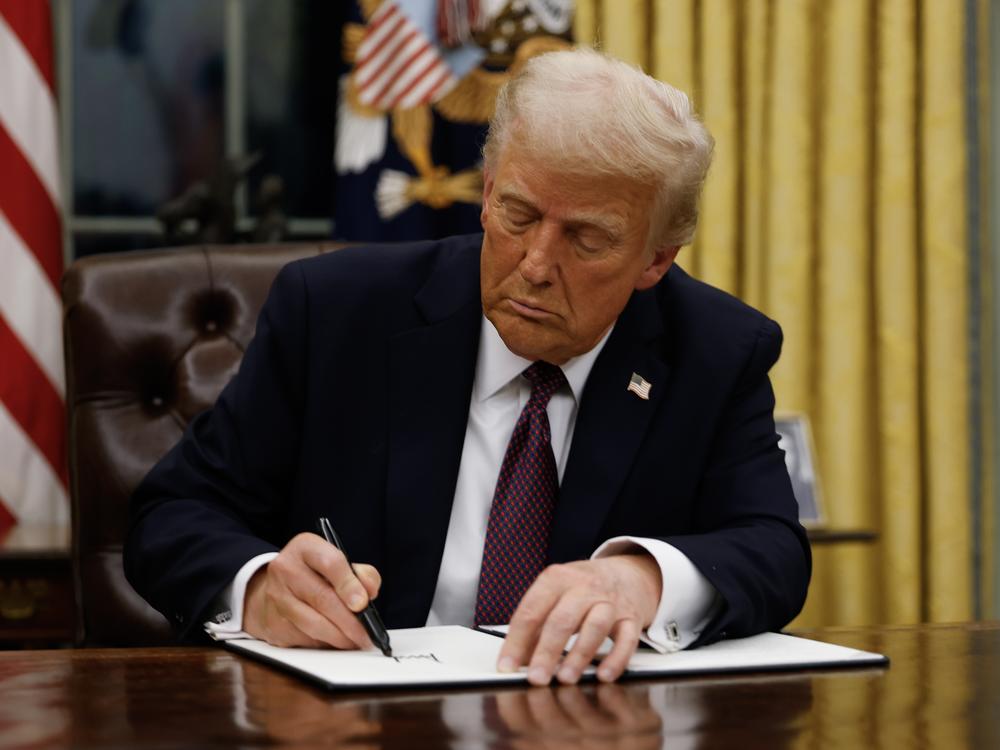Section Branding
Header Content
U.S. judge temporarily blocks Trump's birthright citizenship order
Primary Content
U.S. District Judge John C. Coughenour issued a ruling on Thursday temporarily blocking President Trump's executive order that aimed to end birthright citizenship for children born to migrants in the U.S. temporarily or without legal status. Coughenour issued the temporary restraining order after a hearing in Seattle.
The judge signed the temporary restraining order in response to a lawsuit brought by Oregon, Arizona, Illinois and Washington state, one of several suits opposing the administration's effort to curb the right of citizenship for anyone born on U.S. soil.
In a standing-room-only courtroom in downtown Seattle, Coughenour interrupted the attorney for the Justice Department, Brett Schumate, to tell him how unconstitutional he thinks the administration's order is.
"I've been on the bench for four decades, I can't remember another case where the question presented is as clear as this one is," Coughenour said, describing Trump's order as "blatantly unconstitutional."
"There are other times in world history where we look back and people of goodwill can say, 'Where were the judges? Where were the lawyers?' " the judge said, according to KUOW News.
Coughenour's order blocks federal agencies from implementing the executive order, signed Monday by Trump, while the case is under review.
"Obviously, we'll appeal it," Trump said, referring to the judge's ruling during an appearance at the White House on Thursday.
A spokesperson for the U.S. Justice Department told NPR in email that the new administration will "vigorously defend" Trump's executive order. "We look forward to presenting a full merits argument to the Court and to the American people, who are desperate to see our Nation's laws enforced," the DOJ official said.
Outside the courtroom, Washington state Attorney General Nick Brown applauded the judge's skepticism. "This is step one," Brown said. "But to hear the judge from the bench say that in his 40 years as a judge, he has never seen something so blatantly unconstitutional sets the tone for the seriousness of this effort."
Brown is among 22 Democratic state attorneys general who have joined lawsuits to block the executive order. In a statement after Thursday's ruling, Brown said the "unconstitutional and un-American executive order will hopefully never take effect."
Another attorney general who sued, California's Rob Bonta, said in an interview with NPR that he expects a "similar reception from courts throughout the United States. Any court that is fair, that is objective, that looks at the facts and applies the law, I believe will find the same way."
Bonta said there are about 25,000 children born every year in California who would be entitled to birthright citizenship. If Trump's executive order went into effect, those children would be "deportable at any time, wouldn't have access to federal programs that provide food assistance or housing or health care, things like Medicaid or our Children's Health Insurance Program, and many other services, programs and privileges of citizenship."
The 14th Amendment of the U.S. Constitution grants full citizenship to all persons "born or naturalized in the United States, and subject to the jurisdiction thereof." That provision has been interpreted for decades to grant American citizenship to everyone born in the U.S. Some conservatives believe babies born to migrant families without legal status in the U.S. should be excluded.
In his executive order, Trump said the "privilege of United States citizenship is a priceless and profound gift." This case is expected to be decided by the U.S. Supreme Court.
Law enforcement correspondent Martin Kaste contributed to this story.

